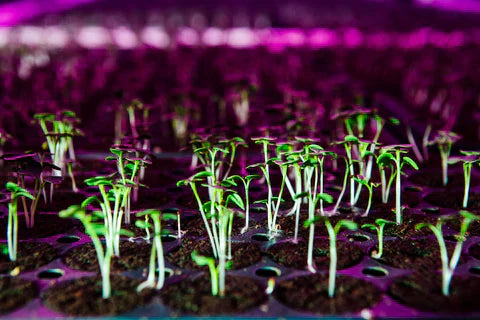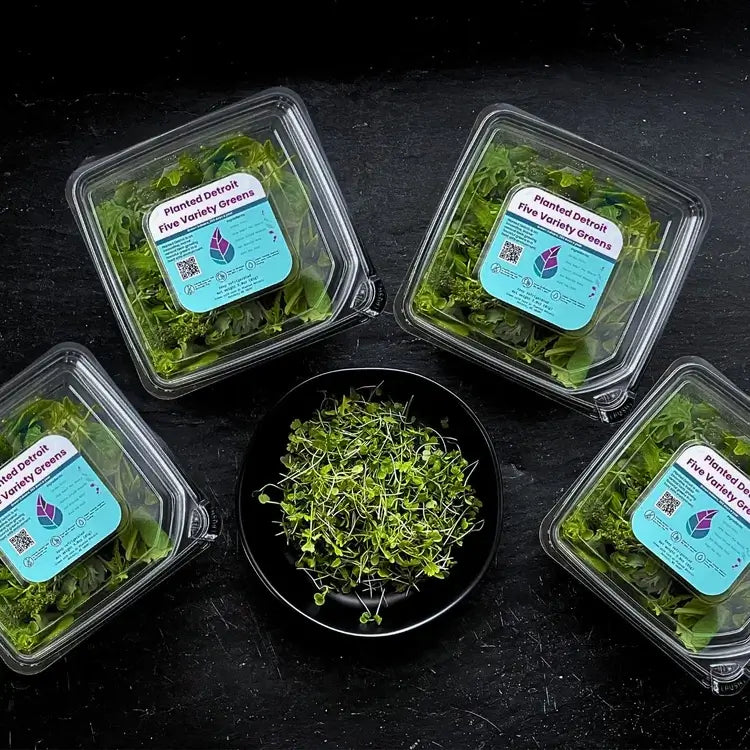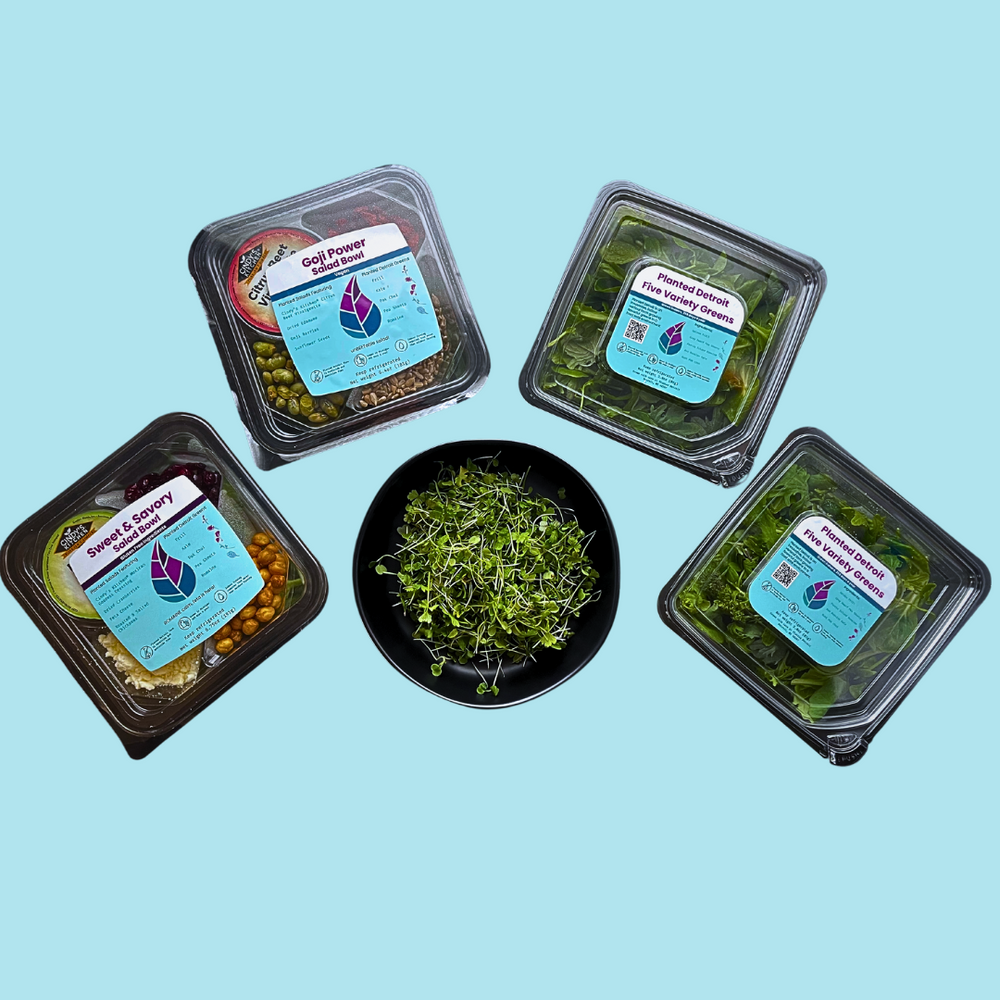
Urban farming is not just a trend; it's a movement transforming cities into greener, healthier, and more sustainable places. Let’s explore the top ten benefits that make urban farming a game-changer for urban communities worldwide.

Urban farming is revolutionizing the concept of food, cities, and sustainability. However, what exactly is urban farming? Urban farming, defined simply, is the act of cultivating, processing, and distributing food in or around a metropolitan area.
Over the past few years, urban farming has taken on more popularity because cities seek innovative ways to approach food security, stronger community building, and sustainable living. Small rooftop gardens have made their way to gigantic vertical farms such as Planted Detroit, proving the strength of urban farming in the building of resilient cities.
Now, let's look into the top ten benefits that make urban farming a cornerstone of modern urban living.
1. Increases Access to Fresh, Nutritious Food
Imagine living in a neighborhood in which fresh veggies are harder to find than fast food. That is the magic of urban farming. They bring fresh, nutritional produce into city centers, but often target areas known as food deserts—communities with limited access to healthy, affordable food.

Produce grown locally, whether it's herbs or edible flowers, tends to be much more nutritionally valuable than something hauled hundreds of miles around the country. Fresh food is not only available in urban farms like Planted Detroit's, with ready-to-eat salad bundles and more, it's also convenient and delicious.
To dive deeper, look into this study on reducing food deserts through urban farming.
2. Supports Local Economies
Urban farms are not all about plants; they're more or less about their people too. Developing jobs and creating jobs through local business support develops an excellent economy in any locality.

Take Michigan, for example. Planted Detroit is the state's largest vertical farm that employs local workers, collaborates with businesses nearby, and reinvests into the community. Every head of lettuce sold or herb harvested directly contributes to building a robust regional food economy.
Another motivation is the encouragement of entrepreneurship through urban farming, where various city-based farms hold markets or share with local restaurants what they harvest. It's a win-win for everybody.
3. Promotes Sustainability
Buying produce grown on an urban farm is, by the way, cutting the environmental footprint of your meals. Why? Urban farming cuts "food miles"– the distance between where it is farmed and the table.
More miles means more carbon emissions. That is not all. These farms are now considered vanguardists of sustainable production; Planted Detroit is an example using hydroponic techniques, among others, and vertically grows food to water them and give space for them.
4. Enhances Community Engagement
What's more wonderful than fresh, locally grown produce? Learning where it is grown and building relationships with like-minded others who value sustainability. Urban farms become centers for community engagement with workshops, volunteer programs, and events bringing people together.
How Planted Detroit Feeds The Community With The Help Of Pipp Horticulture 🙌
It motivates people to participate and learn how to do this in a sustainable manner or even grow it at their house. Besides food, urban farming fosters community connection- neighbors turn into friends, and cities turn into tight-knit communities.
As an answer to this concern in a climate-changed era, urban farming seems like a beamed light where eco-friendly agriculture could exist right within cities.
5. Utilizes Underused Spaces
Perhaps the greatest aesthetic reward of urban farming is to take a forgotten place in an urban area. Vacant lots, rooftops, and even an old warehouse can become lively, thriving green oases.

In this regard, urban farming brings productivity back to barren spaces and presents a fresh landscape that once could not attract much attention. These underutilized areas now serve another purpose besides combating urban congestion, offering smaller green niches in oceanic swaths of concrete.
6. Improves Air Quality and Urban Greenery
Well, did you know that besides being good for your plate, urban farming is good for your lungs? In fact, plants are air purifiers. They consume pollutants and release oxygen, making the air cleaner for us.
Urban farms will continue to make the cities not only greener and healthier but also cleaner air that benefits everyone. Its lavish greenery also serves the purpose of mitigating heat islands, as this creates cooler temperatures in crowded neighborhoods and offers a beautiful contrast to the scorching heat waves.

Urban farms enrich city biodiversity by providing an added habitat for birds and other important pollinator bees while adding charm to the environment.
In addition, green spaces create natural barriers against noise pollution, common in busy cities. The plant absorbs and reduces sound, resulting in quieter and more peaceful environments. The plants help improve water management by collecting rainwater, reducing runoff, and mitigating the risk of urban flooding.
Urban farms do much more than producing crops-they make cities healthier and more livable.
7. Fosters Food Security
Urban farming is an ideal practical solution in a world that increasingly experiences food scarcity. Urban farms will, as such, cut reliance on distant agricultural systems, creating a stable supply of fresh produce locally.
In the event of rapid growth in the population, cities, through urban farming, ensure that every resident accesses fresh produce. Urban farming hence adds resilience to the system of urban food systems by reducing dependency on global supply chains during disruptions.

More so, these farms will have a year-round yield in controlled environments regardless of weather, thus ensuring an uninterrupted supply of nutrient-rich food in extreme climates or in case of unexpected crises.
8. Encourages Healthier Lifestyles
There is magic in food; one grows oneself—or, in other words, knows precisely where it comes from. Urban farming motivates towards a healthier lifestyle because eating fresh, local products make individuals incorporate physical activity, like that related to farming and growing the produce.

The list of mental health benefits doesn't stop here. Plants have been proven to reduce stress and improve human well-being. It's not about food but about nourishing a healthy and happier person.
9. Inspires the Next Generation of Farmers
Through such urban farms, the bright future of farming is more than assured. Schools and other youth programs partner with urban farms to educate children on issues of agriculture, sustainability, and nutrition.
Planted Detroit is actively working to ignite a spark in young minds regarding cutting-edge farming techniques as well as the importance of sustainability. These efforts plant seeds—pun intended—for an inspired green future led by informed passionate youth.
Conclusion
Urban farming is transforming the way we live, eat, and interact with our cities. From healthy, nutritious food to more green space and community relationships, benefits abound and impact in numerous ways.
We can contribute to this amazing development through different means: buying in our local produce, or simply participating in urban farm workshops and spreading the gospel on its benefits. This will lead to a greener, more resilient, and healthier society in the future.

Imagine a world in which all cities are green spaces: fresh food, cleaner air, and stronger communities. That is what urban farming offers that is definitely worth striving for.
So why not take the first step today? Learn how Planted Detroit is at the forefront of urban farming innovation, or go visit a local urban farm in your community to see the magic happen. Together, we can transform our cities, one plant at a time.


